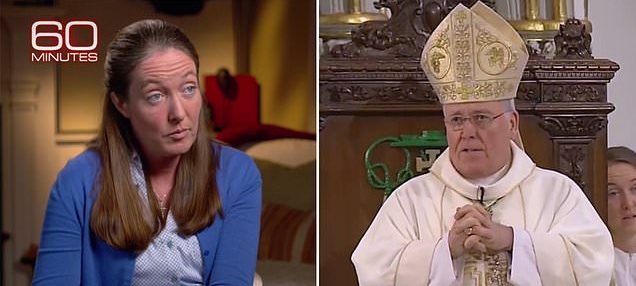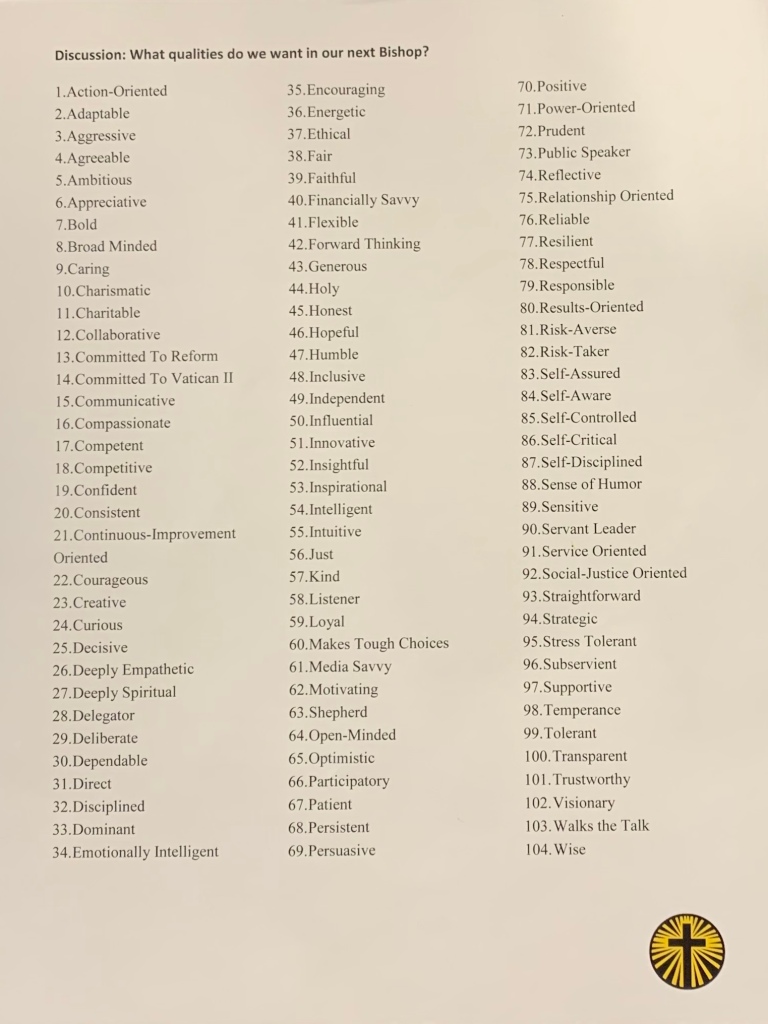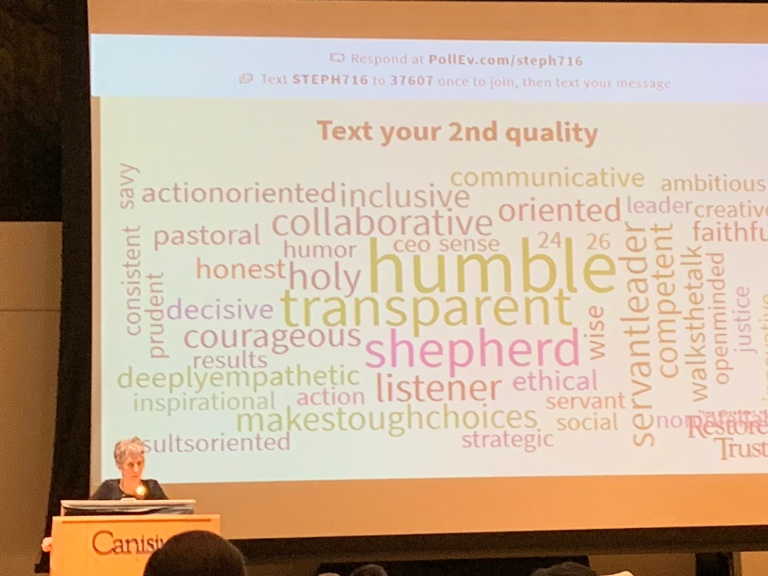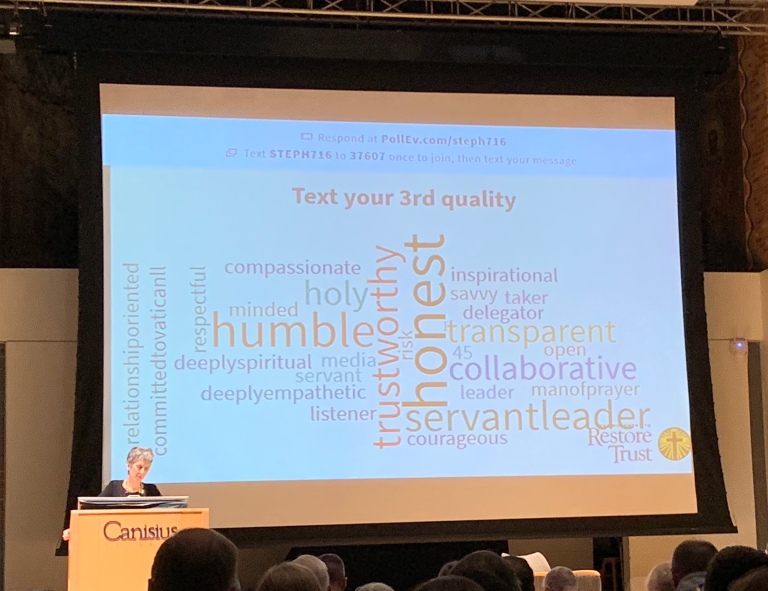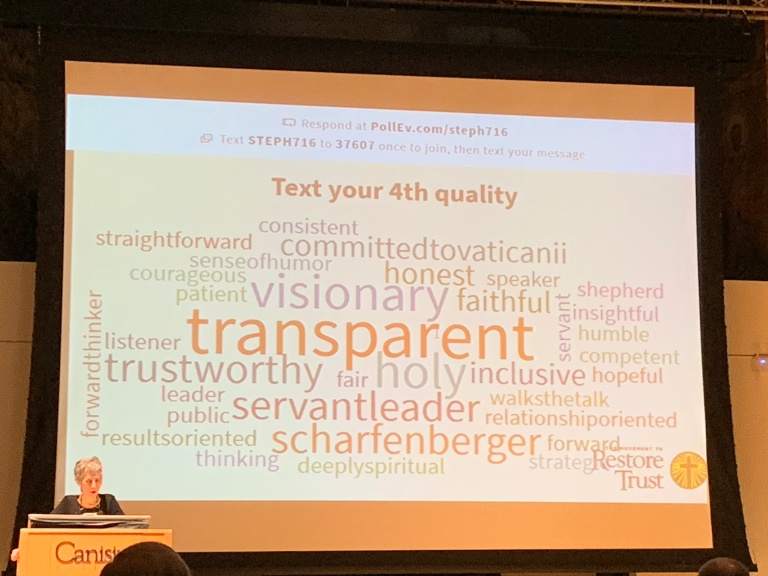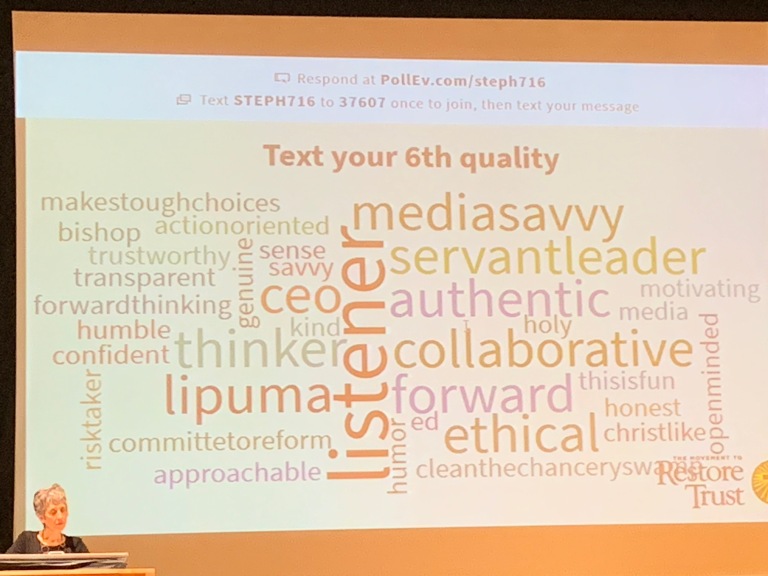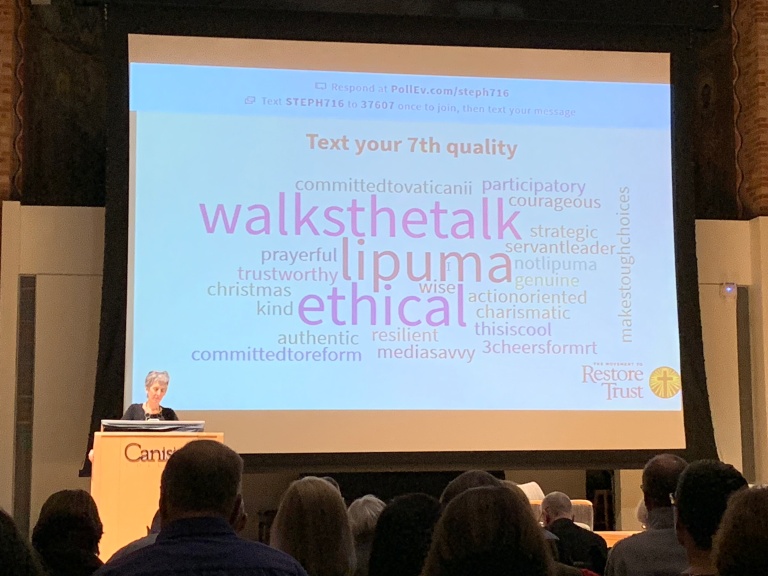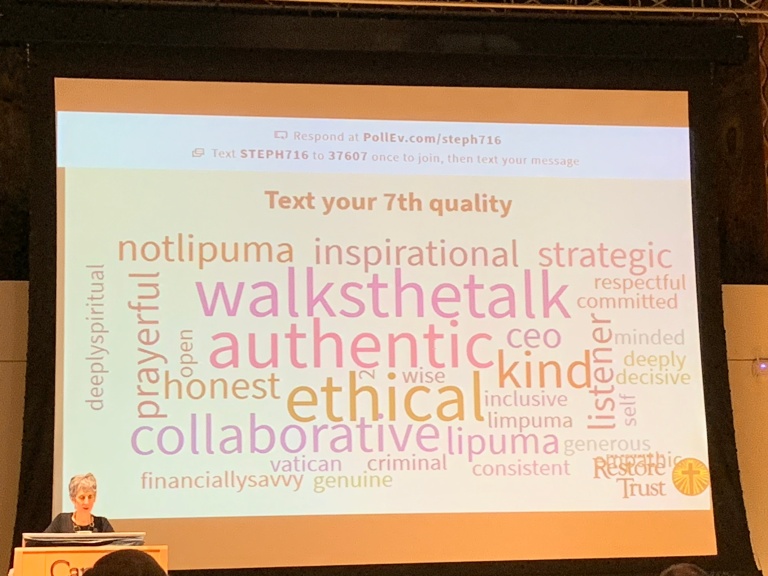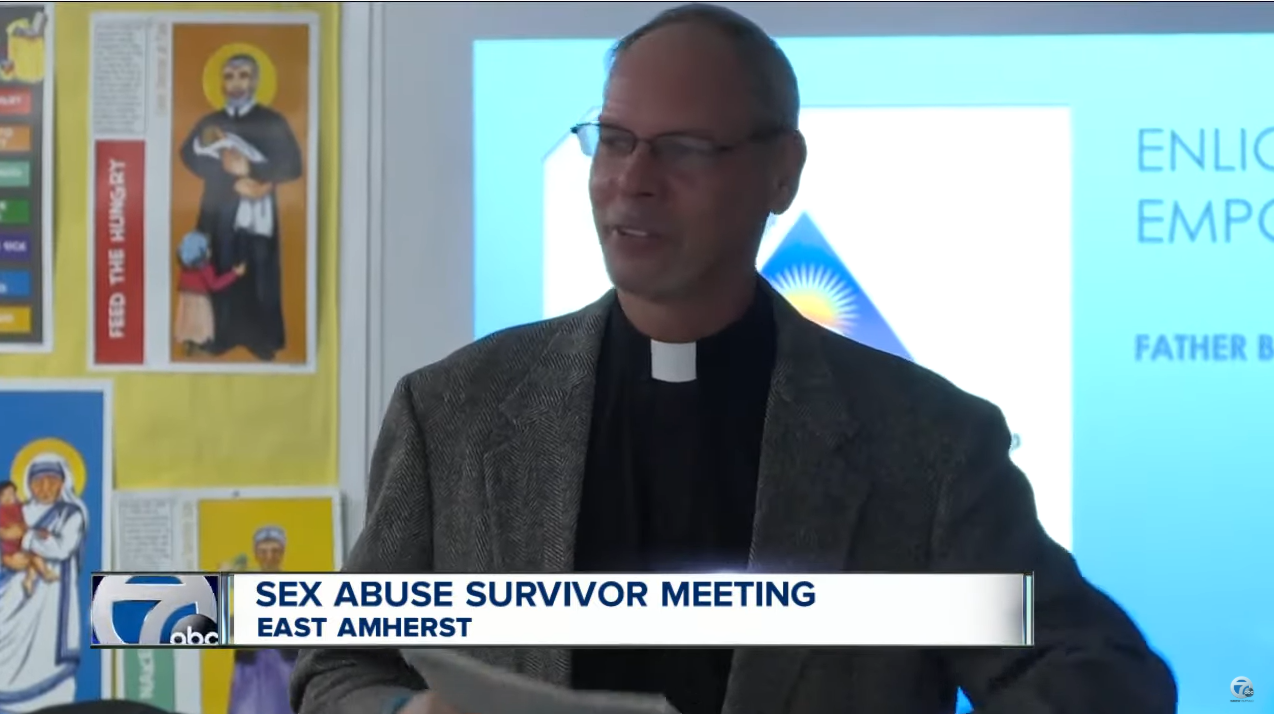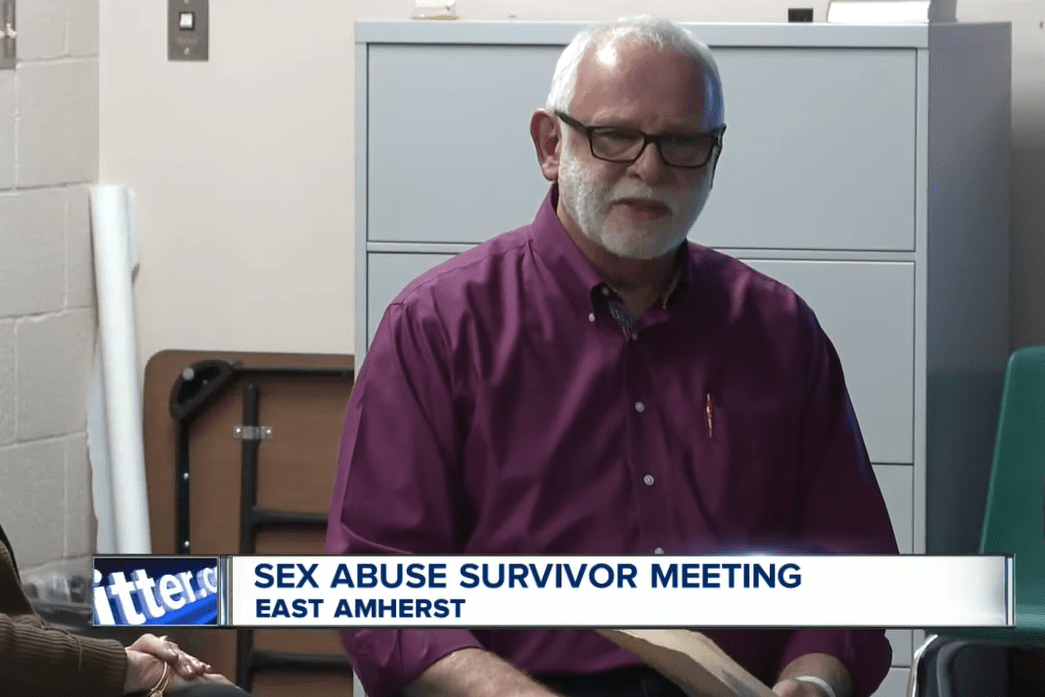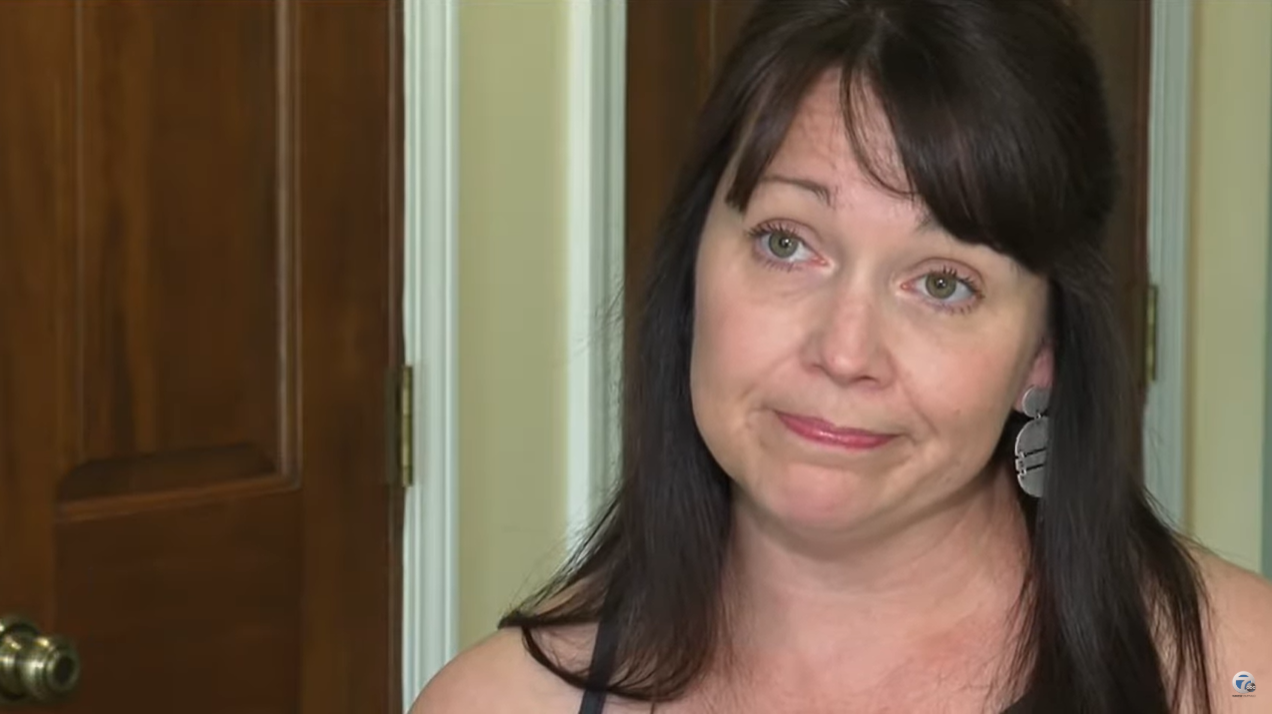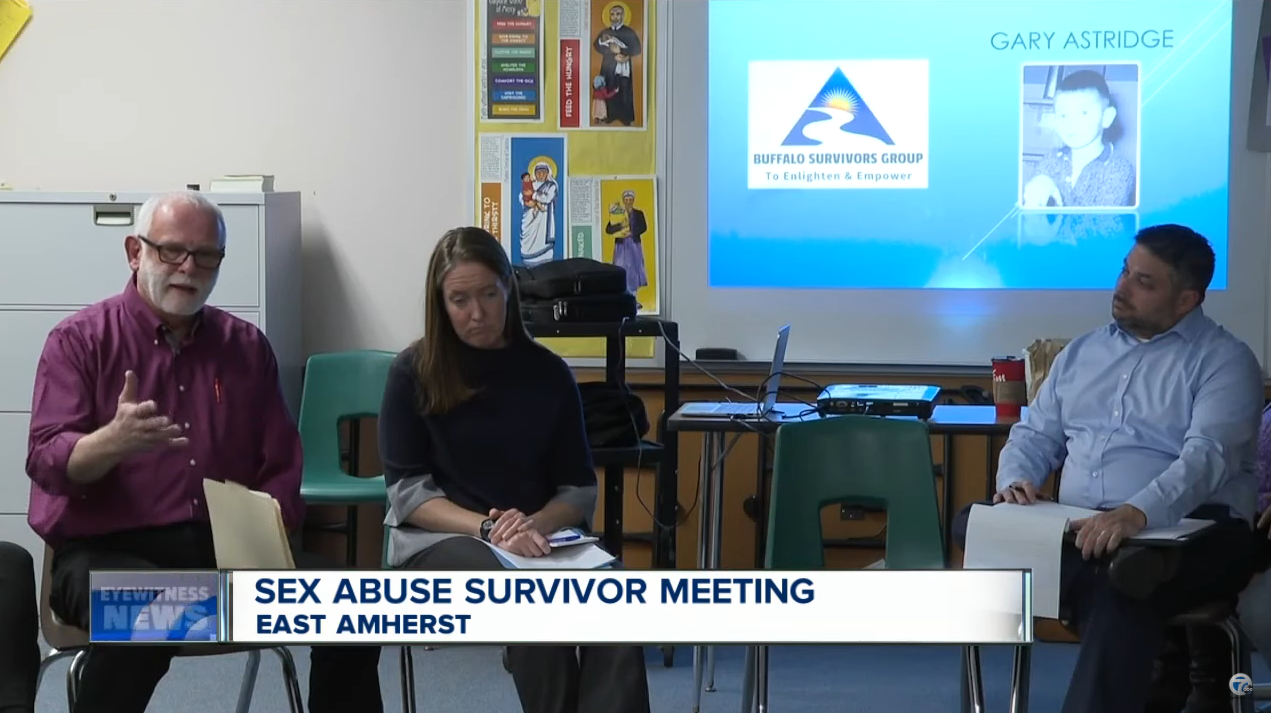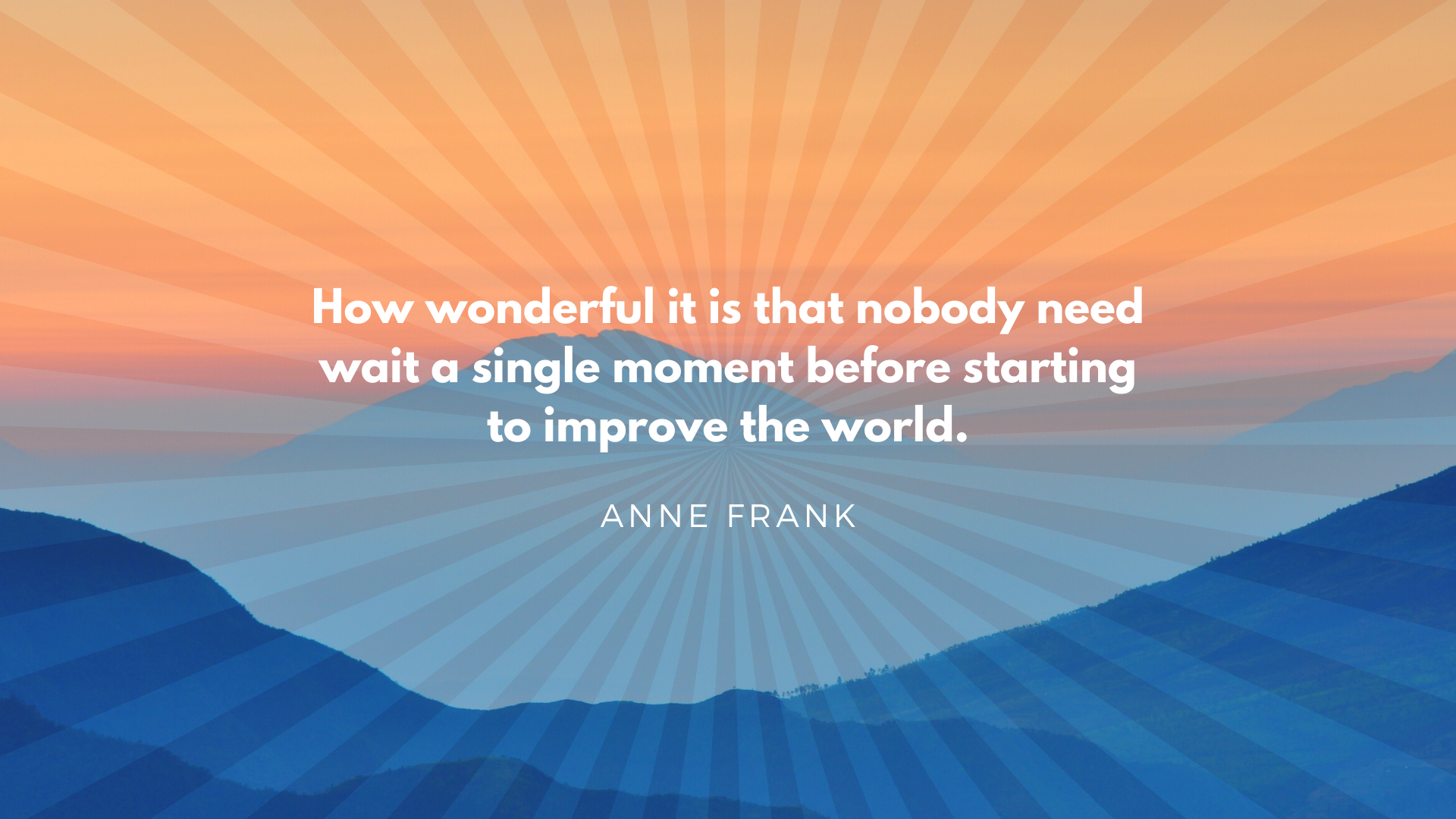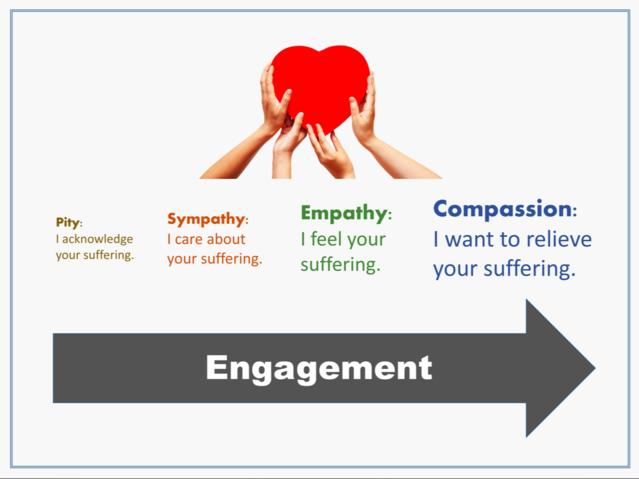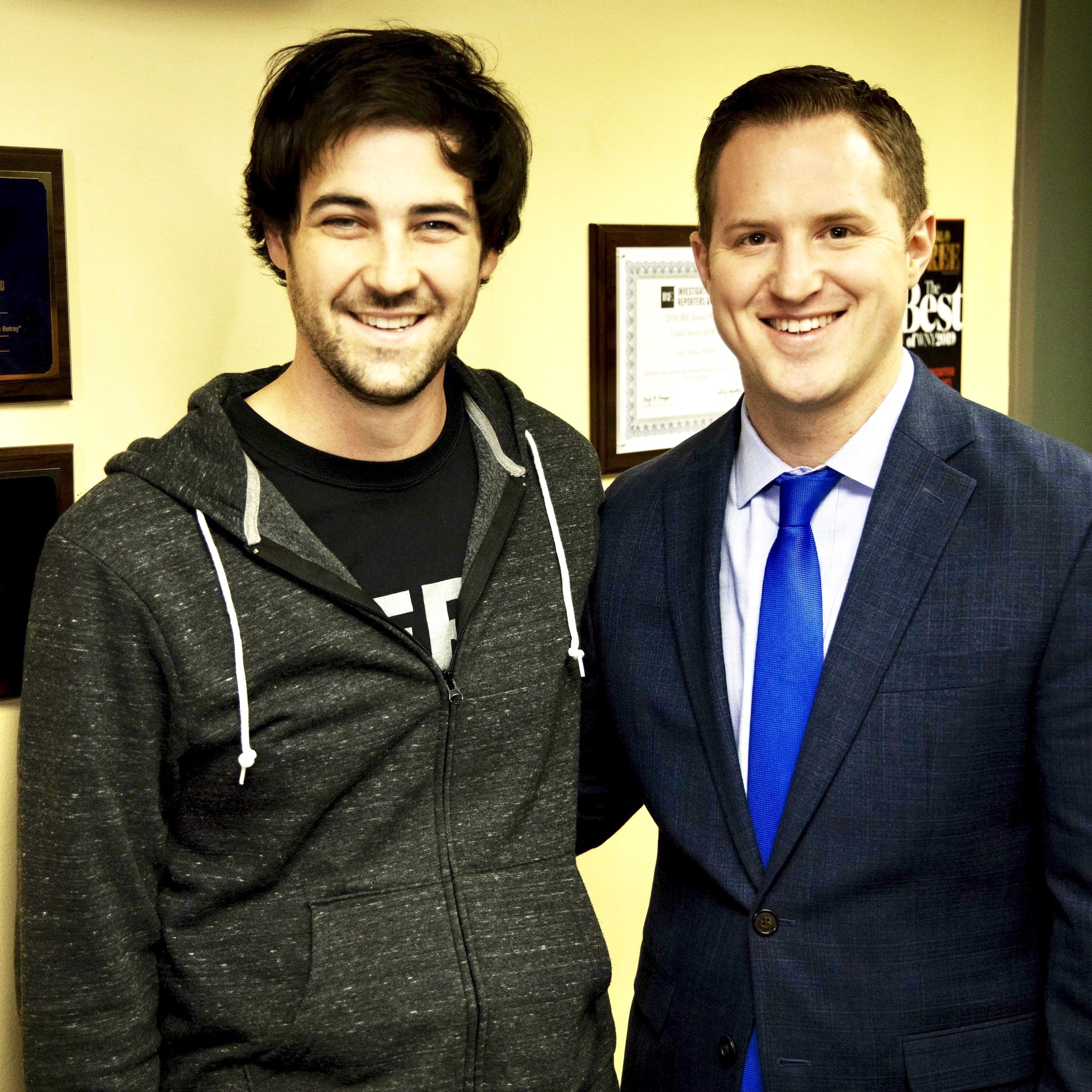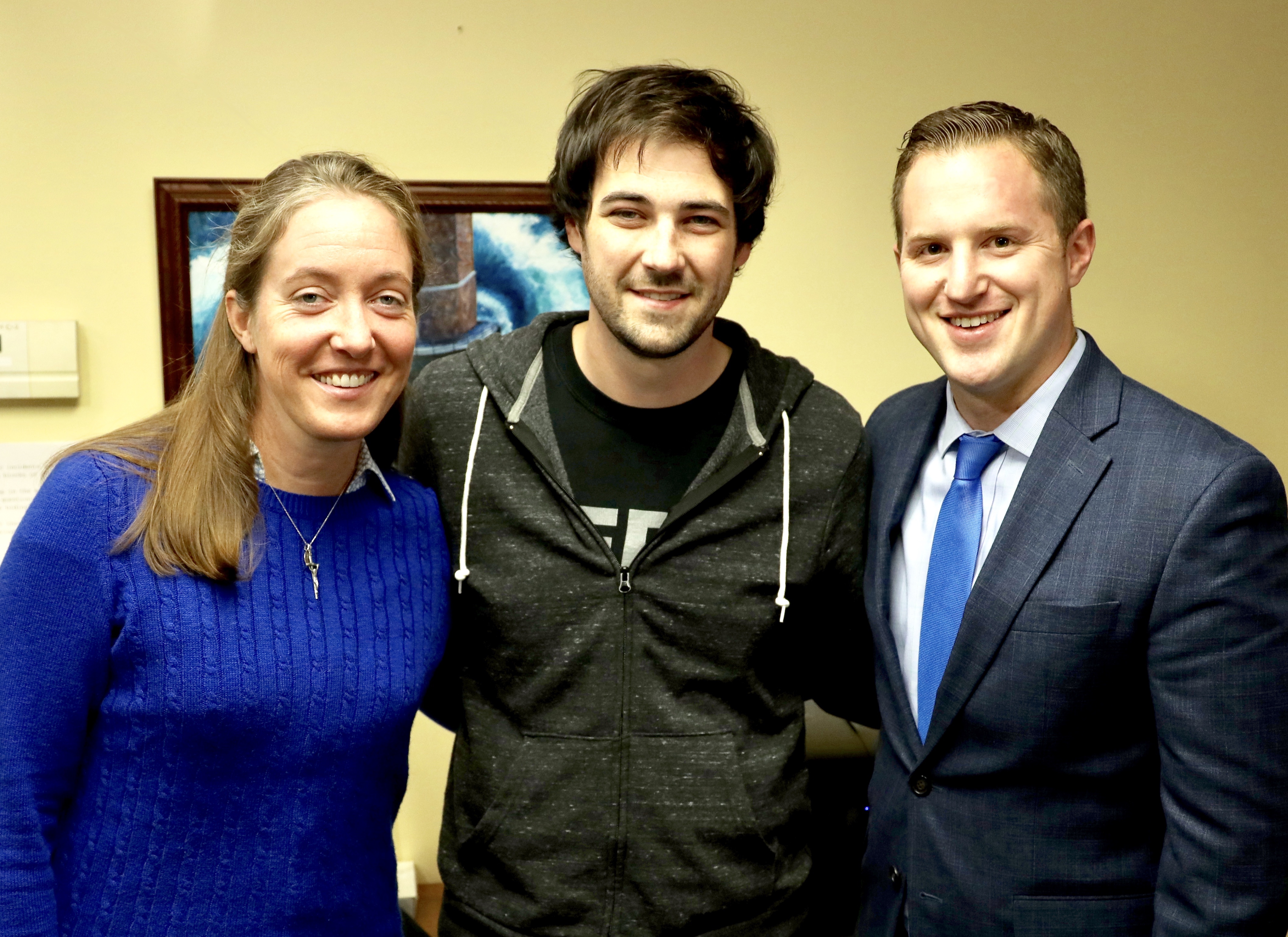The following is the transcription from a recording taken during the parish event on Sunday, February 23, 2020. Text has been tightened when necessary and any inaudible words have been removed to avoid misinterpretation.
Introduction
Thanks, Father Bob. Now just to put a couple of things in context. As you know, I never expected to be here. I never expected to Bishop of Albany. I was a parish priest, happily in Brooklyn. I got a call one day that the Pope wanted me to become the new Bishop of Albany. It was a big surprise. And I was just as surprised by a similar call from a different guy saying we’d like you to help us out in Buffalo.
But I’m very happy to be here, because I believed my job as a priest to be of service to the church any way I can. And that’s why I’m here. I want to do anything I can to help you to be people of God has called you to be. And I say that because … A little bit about my vision about what the Church is. We know that Jesus has called each and every one of us to be a disciple. Therefore, each and every one of us is important and is part of the Body of Christ. And a lot of times, people will ask me questions like, what are you going to do? You, Bishop – how are you going to change the Church. And my response to that is, well I’m just one person. If there are things that are wrong with the church, we can’t blame one person. And if there are things that are going to be set right, we can’t expect one person to do that, except for Jesus Himself.
But what he has done, Jesus has done for each and every one of us is to call us to be a part of that family. So, my first way of looking at this is, we’re all family, each and very one of us. Each and every one of is a plays a part. And each and every one of us has to call out in one another what that role may be.
Percentage of Abuse
Now, another part of my experiences of late and I find it difficult to preach because I can’t help but think that anytime I preach for a congregation, a good … Well I’ve been thinking for a while, maybe about 25% of those in the congregation have suffered tremendously from some form of abuse. But I don’t just mean sexual abuse by priests. That’s a big, big factor. But I mean some form of abuse. Feeling disregarded. Feeling somehow unnoticed, unthanked. And a lot of times, I do hear that from folks. You know, after all I’ve done, no one thanks me or nobody even notices me. If I don’t show up for mass for a week or two, does anybody even notice that that pew is empty.
So there’s a lot of that. Somebody has advised me and said, “You know Bishop, it’s not 25%. It’s about 50%.” Which means probably the person sitting next to you, if it’s not you yourself, probably have a story of pain, a cross they’re carrying. Maybe something has happened in their life. So I can’t help but think of that as a context. I hate to see people suffering in silence. And that’s one of the things that motivates me just to be here. I don’t want anybody to feel left out.
Ad Limina Visit with Pope Francis, November 2019
So I hope … let me put it in this context. About three months ago, as you may know, the bishops of New York State met with the Holy Father, and his mucky mucks all over in Rome, the people in the Congregation. And we sat with the Pope, and that was the highlight of our trip.

Bishop Edward B. Scharfenberger of Albany and other U.S. bishops from the state of New York walk through the Apostolic Palace after meeting Pope Francis at the Vatican Nov. 15, 2019. (Credit: Paul Haring/CNS.)
But, he sat there right in the middle, this big, palatial setting. No tables, no microphones. Maybe just a little bottle of water. And the first thing he said, after he prayed, was just that, “We’re here as brothers. And I want you to be able to speak freely. And don’t be afraid, you can say whatever is on your mind. And I will tell you a little about what’s on my mind.” And he said, “You know, there’s some things that you do that I really don’t understand, in the United States.” And he also said that, “I’m sure there are some things that I do, or I say, or people have said I say, that you don’t understand. But I want you feel that you can talk about that.” And it really broke the ice. So in that context, I’d like to offer that to you. He also spoke about how … That you realize how difficult it was to be a priest, to be a bishop, in this time, with all they’ve been going through. And I say the same thing to you. It’s not easy to be a Christian in our time.
There’s a lot of people who find it very difficult and very scandalized. And so is the pain that we’ve seen. And I can only imagine, when first some of these revelations started to come out, a year ago last summer, with McCarrick and of course the Pennsylvania Grand Jury report. The first thing that I felt in my heart was I felt, “what am I going to say to the pastors, and the people in the parish who are in the front lines?” That’s what I was concerned about. And with the type of questions that they would be hearing from their loved ones … What’s going on here? What can we do about this? And so, that is what really hurt my heart. And that’s why I’ve been trying as best as I can to meet with my old priests, and to encourage them, and also other parish leaders as well, because each person is a leader. You may be the only Jesus that may person may ever known. The people that you meet, they know you’re a Catholic, they know you’re a person who is close to the Lord. You know, they look up to you. And I want to support you in that.
Another thing about Pope Francis … Somebody asked, and I forget who, “What is it that you think about as you go to sleep at night? What are the things that really bother you the most?” You know what he said? He said, “What concerns me more than anything else is the family and the pressures that so many families undergo. And the need to really address that.” So here’s my vision of what I feel about the diocese and the parishes. I see a parish as a family. Or even a family of families. I see the diocese as really nothing else but a family, a family of parishes. The health of the diocese is in the parishes. So something I would like to do is to encourage the families and the parishes within the diocese.
Diocesan Assessments
A question that was has come up and I’ll address that a little more later … what about the assessments, you know. Every diocese has this. This is not unique. But every diocese has some form of an assessment of parishes. And the purpose of it, the general purpose of it, is to assist the diocese in helping all parishes in a way that sometimes it’s difficult to do a little bit on a smaller scale. So there are some things at times, that you could do a larger scale to help parishes out. And that can be all sorts of things, like aid to schools … And that’s one thing. Or for helping people, like a building project, they could do that. Or for helping to supply people that are catechists, and the teachers, in order to do that type of formation. Or the formation of seminarians, deacons and so forth. Some of these programs, even though parishes participate in this, are sometimes best done on a larger organizational level.
Basically, the assessment is what helps the diocese to help other parishes. You can debate that. You know, sometimes is it too much, is it too little, is it done fairly? You’d like everybody to participate in some way and the way they can. Some parishes may be more capable of doing this than others. And there’s a rational basis in order for this to be done. That’s the basis for this.
Abuse Scandal and Abuse Survivors
But back to the original, important thing is that I want everybody to feel that they are a part of who we are as a family. We’re a family of families. One of the things that has brought that home to me is the opportunity to meet with a number of people. I don’t like to use the word victims, but I like to say the survivors of sexual abuse. And I don’t know about you, but when some of this started to break, a lot of this consciousness that we have about what’s been going on, we hadn’t known about it. And all the shocking revelations that now go back some 20 years, back in 2001. Back to Dallas, the Dallas Charter.
You know, my first reaction was, “Well this must be something coming from the media, that’s trying to attack the Catholic Church. Somebody’s trying to hurt the Church.” And I don’t doubt that there are people that have issues with the Church, and have agendas, things they don’t like about the Church. It could be any number of things. You know, on the basis of our pro-life stand. It might have something to do with our beliefs about marriage and all that. Maybe some people feel that the Church isn’t progressive enough, isn’t going fast enough. And we talk about the ordination of married people, women, so forth. Could be some of those agendas. But I have come to believe that that is really not the best way to look at this. The fact is that there have been people who have suffered from tremendous abuse and that is coming to light and it is better that it comes to light.
Now, I don’t think there’s anything new about this. I think the reality of this – maybe you agree with me, maybe you don’t. But I think that since the Garden of Eden, there’s been things like this going on. This is the first time in which we had the opportunity to know about that.
But here’s the thing that has my changed my life a lot. I have come to hear the stories of a number of people that have shared. They’re not all victims of sexual abuse by priests. I mean, anybody that’s grown up in an alcoholic home – if I can say it that way – know how boundaries can be broken. And those who suffer from domestic bias. How many times as a priest, and you hear this all the time, somebody comes to confession, and then to break into tears. And the priest would say, “Is there something you want to talk about,” and the person will say “Yes,” you know, and “My husband if violent.” So they might talk about why she should leave him if he is violent and she might say “Well, I can’t leave him, because if I leave him, then the children won’t have support,” and it’s a tremendous struggle with that. And it could be children abused by parents, parents abused by children. You do know that 80% of abuse, of sexual abuse, happens in homes, by people that are known: parents, uncles, and aunts, and so forth.
So, this awareness, and being able to speak with people, and learning, it really isn’t about money. Most victims and survivors just want to be taken seriously, want somebody to hear their story, and not to judge them, so that they feel guilty. I had one woman, I’ll call her Theresa – that’s her real name because she doesn’t mind if I tell her story. She was introduced to me by another friend of mine who is a survivor. And he was a person who I met when I was on the Brooklyn Review Board. And every diocese has a review board that is a unique kind of review board. By the way, that’s one of the things that some people have asked – what have I changed since I’ve been here. One of the things I wanted to be sure is that our review board, that advises the Bishop on any cases or allegations of sexual abuse by clergy is truly independent.
So, I made some changes right up front, in terms of who was on that board. In other words, I didn’t want it to be an over-representation by the diocesan officials. That the persons on the board were not employees. And that they truly were independent. No attorneys on the board, no diocesan attorneys. Not even the Vicar General. But people who truly would speak their minds, and I made it very, very clear that I expect them and commissioned them to be independent. I always tell them don’t be afraid of offending me. Tell me the truth, I can deal with the truth. Don’t be afraid of what the Bishop will say, what he will think, you know. Like any other human being when I hear stuff sometimes I, you know, I lose my cool. But, I want to be told the truth. And I think they understand that.
But I had that experience during my time on the Brooklyn Review Board. I was the one priest that was chosen by the other clergy to be there because I am a canon lawyer like Father Zilliox. But I came to really know some of these folks, their intentions, their honesty, the truth of what they’ve experienced. And it’s really, really changed my life.
Speaking about Teresa… she had suffered her abuse when she was about six years old, at the hands of a priest friend of the family, when he used to visit her parents. They thought the priest was a living saint. And she didn’t know, of course. What does a six year old know what was happening. And he started to abuse her. This went on for three years, until she was nine.
And then he got sick, and he didn’t visit anymore. How does a nine-year old, a six-year old, process this, you know. And she had two other sisters. And she shared with me some of the things that she went through, some of these stages, like oh, she started to think … Obviously, she didn’t feel … I shouldn’t say, obviously. Maybe that’s not obvious. But she didn’t feel she could tell her parents, because her parents loved this priest so much. And she was afraid they wouldn’t believe her. So, it created some distance with her parents. And then she started to feel guilty, that maybe this was happening to her sisters, too. So she felt a responsibility that somehow she the victim, was bad, or worse, because she didn’t help protect her sister. Now, this is a nine-year old girl dealing with this.
So you can see how with this kind of experience, and not having anybody to talk to, and feeling even more guilty because she wasn’t talking to anyone, you can understand the dilemma here. She went into her teen years, and being a very brilliant person, she did well in school, but gradually, she started a lot of other issues, depression and so forth. She thought of taking her own life.
As Teresa tells the story, she says, “You know, I left the church 13 times.” She did go through anger and rage. By the way, let me say this. If you any of you are angry about anything, don’t repress it. That’s the necessary stage. And if you’re angry about something, say it, say it. You can’t deny it. But you can’t stay here either. Anger can be a very good thing, because it can be very justified, and it has to be expressed.
But then, it can also be a motivation, and say, okay, now how am I going to take this passion, and put this into something that I’m going to do to help this get better. So it could also fuel a passion. It doesn’t just happen, and you get over it.
You know, one of those things for anybody that’s been traumatized and some of you know this from experience, is that there’s what we call a triggering factor. I don’t know if you’re familiar with that. It’s like PTSD. Anybody that’s been a victim, if you’ve been to Vietnam or something like that, you experience battle. You can be home from that, and you’re in the kitchen, your wife drops a pan, and it sounds like a bomb going off again. It can trigger reactions. I don’t mean this to be in any way flippant or funny. There’s a lot of times when the person that has been a victim, of any sort of abuse, may not feel comfortable in certain spaces. So a person that calls up and wants to talk about their experience, they may not want to do that in a church because that may trigger in their mind memories of the person who may have been a priest that abused them.
But Teresa said she left her church about 13 times. She kept going back … And this is my point … She kept feeling called to come back. So she would come into the church, and she would maybe sit in the back. She wouldn’t necessarily stay for mass. But she felt Jesus flowing. And she said, “I’m not going to let anything interfere with my relationship with the Lord.” And, little by little, she came back. And believe it or not, today, she wants to help the Church. She wants to help priests. And she even came to me as the bishop and said, “Bishop, I want to help you.”
This has stirred my belief, that every person that’s hurt in any way, whoever you may be, is actually not only a precious member of our family, but somebody that is an extremely important part of our healing process. And particularly, those who have often felt most affected. To feel that you’re part of this mission that we share. So, that has been … What I try to do is, I’ve always seen this as primarily, as a fundamentally spiritual thing. Whether it’s adults or it’s children, it’s a spiritual, moral thing. We all need to understand the dignity of every person. We can’t use other people as objects. And if somebody is not able to fight their tendencies to abuse somebody … And there are people that have mental … No question, psychological illnesses. You know, many of the priests that abuse, themselves were also abused. Which isn’t to say that everybody who’s been abused is going to do that. Many people, you know this from your personal experience, who end up resorting to violence in the marriage, for example, or the relationship, were themselves subjected to violence, by a parent or somebody in their life. We have to try to break that vicious. And the only way that we can do this is by listening to one another and walking with one another and supporting one another.
Spiritual Renewal
In my mind, what I try to do is encourage everybody to get holy. So look at our own lives and say, what are the patterns in my own life that aren’t holy? Where are my vicious circles? What is it in my mind that I need to touched by God’s healing grace?
Because each and every one of us, Jesus loves. I remember back in school, they used to tell us “Jesus loves you so much, that he would die for you, if you were the only person in the world.” And that’s the truth. And if every one of us really believe that, that no matter what we’ve done or where we’ve been, or what bad thoughts we’ve had, or what has been done to us, or how unworthy we feel or how broken we feel. Or how hopeless we may be, it doesn’t matter. That Jesus is still reaching out to us, and into our lives. He’s saying, I love you, I would die for you. And it’s the whole story of His life.
So, more than anything else, I think that it’s a spiritual renewal for each and every one of us … Priests and lay people alike. And one of the reasons that I call for the consecration of our diocese to the Immaculate Heart of Mary – 33 Days til Morning Glory – a little retreat based on the spirituality of St. Louis deMontfort. I have found it in my own life to be tremendously transformative. You give everything over to Mary, and you trust her to lead you to the heart of Jesus. And that’s really what it’s all about. So, it’s a spiritual thing.
Administration and Investigation
And then as I said, the confidence in our administrative structures. I know there’s been a lot of thoughts and talk about cover-up, and things like that. And secret files, and so forth. And I can talk about that if you want. There is in Canon law … You know, there is such a thing as a secret file. However, personnel files of priests and lay people, have never been a part of so-called secret files. But usually they [secret files] were for things that were not in the public forum, so to speak, like a clandestine marriage, a marriage that took place maybe between people that was not legal, according to church and to civil law. Or correspondence maybe between the Holy See that was confidential, things of that nature.
And I said this many times, I’ll say it again: Criminality is not entitled to secrecy. And I’ve already asked the District Attorney of our county right here to please, come in, look at the files. I don’t want anything to be hidden. [in:
We know you know there is an Attorney General investigation going on currently. All personnel files are being subject to a review, to see if there is any evidence of anything that is being hidden.
Survivors Viewing Files
And I said it very publicly too, if there’s any person that has suffered from abuse, who wants to know something for whom it would be helpful, in the process of healing, to know something about the history of the personnel who abused them if it was a priest. And I would be very happy to sit down with that person, and let them examine the record to see what is in there. Where was he located, where he was treated, and so forth and so on.
And so, as far as the transparency and openness, ability to take a look at something that affects you personally, I believe you should be able to see that. So, I just want you to know that that is another thing that I have been trying to do, to open up the files.
Financials
As far as financial records are concerned, you know there is a Diocesan Financial Report that is published, and it is detailed on our website. And it is done every year.
Sometimes, one of the questions that comes up is, what about parish collections? You know, is that going to be used to pay off settlements. And to the best of my knowledge … Parish collections are merely … The money that comes from parish collections belong to the parish. A parish is a separate corporation, according to New York state law. And not even the Bishop can just say “give me your collection.” That’s why I have to ask for your assessment – I can’t just come in and take it. That is your money – that is parish money. But I’m asking for your support for the diocesan services that are really there for you, and for all of your parishes. It’s not for me or for anybody else.
So, there is that, that separation. Now again, I understand, there may not be credibility, and I accept that. But you know what I’m saying, that I have to follow the law, too. So, when I was asked by the press on the very first day, they were asking me if I’m going to make changes and publish the files, and things like that. I said I will do whatever I can within the parameters of canon and civil law. So, I want to follow whatever the procedures are. But to answer the question though, parish funds cannot be used to pay the settlements.
So, I don’t know if there are other questions, but these are some of the things that I’ve been hearing, about transparency, and files, about finances.
Abusive Priests
What are we doing about priests that abused – you know, where are they? Who monitors them? This is one of the things that I take very seriously. And I’m in the process right now of making sure that I have contact with all of them and know who they are. Again, my own Diocese of Albany, and I don’t want to do anything here I’m not doing there, and vice-versa. But recently, I formed a committee, that’s specific role is to make sure that even if process has not been completed yet, that we know where he is, and that he has supervision. So, it’s very, very important that we take care of that…. You know, we’re a big family, and both those that have done wrong, as well as those who have been harmed.
Miscellaneous
So, I think I’ve spoken a little too much. But I wanted to give you some ideas of some of the things that I’ve been reading about, and trying to do, and … But you may have some advice for me. And you may have some questions for me about things that … And ask me about anything. Some people want the Latin Mass back, and I actually did a baptism yesterday in the traditional form, in the Latin Rite. I don’t know if you’ve ever seen it. It was very interesting.
But one of the things that impressed me is that in the old Latin Rite, there was a lot of mention about the devil and the influence of evil. And I don’t see a lot of that in the new rite. You know, I remember back in the ’60s, and that was a time we were burning all this stuff, and everyone’s just having fun and didn’t want to talk about sin anymore. I don’t think we need to worry about that in our day and age, to be honest with you, that the devil is real. Satanic influences are real. Temptation is real. And we need to pray to St. Michael the Archangel. And we need a savior because we can’t save ourselves. So anyway, but it was a fascinating thing to see that, the desire to protect the child from the influence of evil, it was mentioned again and again.
And I’m saying, isn’t that really where we failed. And that’s one of the reasons today, thank God, we do have, I think better procedures – if you see something, say something. Do not be afraid. If you know somebody that talks to you say, don’t be afraid. Talk to the Bishop. It’s okay, I won’t yell at anybody, I promise. And I know you have a nice pastor. But I can’t guarantee that everyone who approaches a church person, is always going to feel you know that they’re going to be taken seriously.
So, I don’t know, the first person that asks a question, you’re the bravest.
Question & Answer Period
Moderator:
Thank you. Just to remind you to please line up in the center aisle and we will have one question per person and I’ll let you know when we’re starting to run out of time.
#1 Questioner:
Your Excellency, we thank you for coming here. We do have a question, with regards to the three clergymen who are credibly accused of sexual abuse. One of whom has a very nasty history, going back several years, and going back to the seminary. None of the victims have received any kind of support, or any kind of reconciliation, with regards to what has happened to them, what has occurred with those priests. And, even in this diocese, we don’t know what’s going on. We don’t know what’s happening with these three priests, and their victims. So, I must ask: what is going to be done? And I think that is a fair question to ask about these three members of the clergy and for their former parishioners.
Bishop Scharfenberger:
If you would do me a favor, to write down the names of those three priests, and any victims that you may know of, so that I may get in contact with them and I’ll do what I can to address it.
1st Questioner:
I’ve already given Father Bob an eight-page treatise on the subject.
Bishop Scharfenberger:
Then if it’s okay with you, please get that to me and I’ll do what I can.
2nd Questioner:
Good afternoon, Bishop. You said that the parish funds are not to be used in the lawsuits to reimburse victims. But what about the assessments? And what about Upon This Rock?
Bishop Scharfenberger:
The same thing. The same thing with Upon This Rock. The funds have to be used for what they were designated for, and what the program said it was for. And for the assessment, every single dollar goes specifically for the support of diocesan programs, and those that run those programs. None of that goes to any settlements.
2nd Questioner:
So, just to clarify. Where does the money come from?
Bishop Scharfenberger:
Through the specific agencies in the diocese that are responsible for helping the parishes to do their work. So that would be —
2nd Questioner:
No, I mean the money that you’re going to pay out to victims. Where does that money come from?
Bishop Scharfenberger:
Probably from the sale of the diocesan assets that have accumulated over the years. In other words … you know, from the sale of, probably property, and probably from money that has been invested, and the interest on that money. I don’t know if it’s started or what has been done. But that’s where it will come from.
3rd Questioner:
Thank you for coming, Bishop. This touched on a topic that I am very interested in – properties and the appearance of our diocese. In your time hear, we’ve learned that our seminary and formation center will be closing. And I know a spiritual center, a monastery, was put up for sale. As a lifelong Buffalonian to realize that the appearance, the face of our diocese is losing two long-standing institutions, might we expect any other changes, any property losses within the diocese, and is it for payment?
Bishop Scharfenberger:
Well, I can tell you this much, the decision not to continue with the seminary program is not related to settlements, at all. It’s based upon the actuals, the circumstances we’ll be facing were actually faced for many years, in which the seminary budget had a severe deficit, of roughly about $500,000 a year. And the reason that it’s been able to continue … And it’s been a wonderful seminary. I want to say that the history is illustrious, and that has to be fully acknowledged.
But, for a number of years, the reason the seminary is able to continue is because of substantial reserves, that have built up over the years. And occasionally extraordinary gifts of friends, who have been able to help it. Of course, we can’t plan on those extraordinary gifts. But as we were looking forward, what we were seeing is that the reserves that we have been counting on, will run out in a year and a half. So in a year and a half, they would no longer be there, we would still have that $500,000 shortfall.
And the diocese itself, we’re not in a position to support the seminary. So, the question was, when did we make that decision? You know, to not continue any operation. So I was faced with the question of, all right, when do we do this? Do we do this now? Or, do we put it down the road? If we were to put it down the road, the only time we probably could face that debt would be next year at this time. The reason being that an academic institution like the seminary, where you have faculty and staff that have to plan for their own future. They have to have time to do that. So you can’t make that decision in June, or in September, whether it’s in operation. So it really has to be done before that second semester starts.
So, I made the decision to ask … Basically I asked the board to consider this. You know, there was also a study done by a non-binding committee, that actually did recommend that this particular decision … Actually made three recommendations. And that information was shared with the board. There was, I have to say, a very, very intense discussion on the board and many people weighed in.
But ultimately, the majority of the board did decide to make the recommendation to close. They brought that recommendation to me and I brought that to the members, the corporate members, and the rector, and so forth. They accepted that. But the decision was not based upon any … Actually, my understanding is, is that the land is owned by the diocese. But that the buildings themselves are owned by the corporation, the seminary corporation. So what eventually will happen to that remains to be seen. There may be some interest by developers, moving forward.
We’ll also say that we will continue to support the promotion of vocations. But actually we will involve even more people locally, in the formation of our priest and seminarian, as most dioceses do. So they will be sent to seminaries for their theological education.
But they will receive also pastoral formation, human formation, spiritual formation, and it will be done most likely right here in our diocese. And we will do that well I can assure you of that. We have to continue to promote a culture of vocations. And if you have a vocations committee in your parish, great. If you don’t, let me know, because I want to start one. Because sometimes, the best way to move vocations forward is just to ask, and pray. I know a lot of people … Well, I can tell you a story, but there’s other people that want to speak.
4th Questioner:
Good afternoon. This has been a long struggle in this diocese, and a long process. There have been a lot of punitive actions before you got here. And this parish, as you may know, has been very outspoken. We have members of our parish who have been very outspoken, on TV and different places. And, we have been made to feel that we are free to speak, and to share our opinions, which is not the case in other parishes in the diocese. I would like from you, some sort of guarantee or word, that our people who have spoken out, such as Father Bob and Deacon Paul Snyder, are not going to be punished. That they’re not going to be asked to leave this parish.
<Spontaneous and sustained applause that led to a standing ovation>
I’m a lifelong Catholic. I’ve been in church choir for most of my life. I’m here because of this parish, because of this community. And of our neighbors. And I can tell you right now, as difficult as it is, depending on change of leadership of this parish, I will be out again. It’s a very, very difficult thing as a lifelong Catholic, because this is a huge part of my life and tradition. And it hurts me when I have left for periods of time. So I just asking for your reassurance. Thank you for coming here.
Bishop Scharfenberger:
I can reassure you that we don’t punish people for speaking truth. So, that’s one thing that I assure you of. As far as transferring pastors and people like that, there’s any number of reasons that a bishop may transfer a pastor. Could be for the needs of the parish. Nowadays, it’s less likely that you will take a pastor from a parish, it’s more likely to give him another parish, or another job to do, while keeping his current job. So that’s been the pattern.
But I can tell you, in my mind, that this vindictiveness is just not part of the Christian gospel. So if that’s a reassurance, take it as such. Any decisions that I would take or I hope my successor would always be based upon what’s in the best interest of the diocese. And sometimes pastors themselves ask for change, too. They don’t always get it, but sometimes they do.
But those would be the processes we follow, and I would hope that that’s … I can’t speak for the past. I’m saying this may be different from what was done in the past. I can tell you as long as I’m here, any decisions that are made will be based upon pastoral duty. And you know, anytime with a change pastors, and I’m not thinking that way, okay? But, many times that a pastor has taken from one parish, to go to another parish, it’s always very difficult to accept.
So you have to be prepared for that possibility. Sometimes people are changed for health reasons, you know? So, I can’t give a guarantee. But I can tell that as far as reasons why somebody would be moved or transferred will not be based on any sort of vindictiveness or punishment. That’s childish. Thank you. I hope you understand that.
5th Questioner:
Hello. As a member of a family that probably was here at the inception of this parish and built St. Mary’s church during the Civil War. You have answered the question, as far as money. And that was my main question. But I’d also like to make a suggestion, coming from my family.
For who are we going to install for a bishop? And I would like to see a pastor, a priest come from this area of western New York, not from Boston, or wherever. But, we do have someone that is possibly a candidate in this parish, and he’s come back here, and I would like to see him at least considered for it. I would like to see Father Jack Mattimore considered for bishop.
Edward Scharfenberger:
Did you write to me before or was that somebody else too?
<Cross talk>
5th Questioner:
All right. I would like to see that.
Bishop Scharfenberger:
Thank you very much for that.
6th Questioner:
When the whole scandal broke out, we were not supported in the diocese. We were actually left in the wind. I did want to know, moving forward, how will we know that the diocese helps support us? Because we weren’t supported. Our bishop came for our mortgage burning but when the crisis hit, he didn’t come back to help us. Moving forward, how will you help us get through, and help us heal even more? Because a lot of people have left this parish, that I have known.
Bishop Scharfenberger:
That’s a good question, and good, that’s one of the reasons I’m here now. And anything I can do personally when I’m around, I will certainly be happy to be here. I know I have Father Bob as a good collaborating brother to help. And the only thing more important that I can think is this … One of the things I had in my mind, is to create some way in which we can prepare, train, support, people in every parish … Or at least in every general area … That have specific skills or who can develop certain skills, in how to work with people in the light of these questions. So for example, if somebody does have … Personally has problems with a personal experience of abuse – who do they go to? I think … It pains me that somebody … You know, somebody comes forward and says, I have this issue, I have this problem. And then they’re just told, oh, on the website, there’s this number, you call the 800 number, you just call and they’ll take care of you. Now, that is true. There is an 800 number, and everybody’s encouraged if you know somebody that’s been abused or for yourself, yeah, report to the police, call the number. But I’m more concerned about the pastoral approach, and somebody knows that there is a person there, or there are people there, to walk the walk with them. A social worker would be one or a counselor, certainly somebody that has a spiritual dimension, because as you know, a lot of psychiatrists and social workers will not go into the spiritual development. So, what I’m trying to say is that I want to, going forward, develop sort of like oases of security in every area. Every parish … For example, if there’s 5 or 6 people that will support anybody that has any sort of experience, whether it’s domestic violence, sexual abuse, whatever, and there’s a safe place to go. And they will get the direction and the care, the accompaniment that they’re looking for.
I don’t want to use the 12-step programs as an analogy, because that may be offensive to some victims. But any of you that are in a 12-step program, whether that’s AA, SA, know that there is a wonderful context in which a person can anonymously come forward, hear other people. And then eventually maybe even get a sponsor. A person to walk with them. It concerns me that sometimes, where do you find a person that you can bounce off on if you have an experience. If you’ve been through a divorce, you know, trying to reorient your life. So, those kind of oases are important… It doesn’t have to be a priest or the deacons, you know, there aren’t enough of them around either. But if they’re working with the pastors and the deacons, and with some parish leaders, we could marshal the resources. Social workers, counselors, spiritual directors, storytellers, listeners … I think the charisma of listening is a very, very important one in this day and age. People that can hear and accompany, I think those are things that we can do, and I’m going to look to encourage that throughout the diocese. I hope that will help give some direction as far as I can see. Okay, thank you.
Moderator: I’m sorry. There will be just one more question again to allow time for the Bishop and Father to prepare for Mass. So this is the very last question for today.
<Crosstalk marked by several loud “no’s” from the people in the pews>
Bishop Scharfenberger:
Four more. How much time do we have?
Moderator:
Five minutes.
Bishop Scharfenberger:
Okay. So if everybody takes two minutes, we should be able to have that time to prepare for Mass. Okay? Let’s try this. If everyone takes two minutes, we’ll have to go fast. And I would like to get to everyone.
<General applause>
7th Questioner:
I am a father of the parish as you can tell (smiles at the child he is holding). I’m also the scoutmaster of Boy Scout Troop 92 here at St. Mary’s. Question and a recommendation. I know from seeing things here at St. Mary’s, they take very seriously youth safety here. The Boy Scouts, a youth is not allowed to be alone with an adult. Therefore, if that’s always followed, this stuff never happens. So my question is, can you assure me that diocese-wide, there are never any more children left one-on-one with any adult at all? That’s really the question. I think that goes to the core of the anger within the community, where people wonder, how could this happen? How could it happen long ago and could it happen again. How is going to change at this point? Absolutely guaranteed, no exceptions, would you be able to say that?
Bishop Scharfenberger:
I can tell you what the policy is. I can’t tell you that I can personally enforce it. It really depends upon pastors, and scoutmasters, and parents, to … Obviously, our job is to communicate what the policy is. So, we’ll do everything we can to make sure the policy’s complete. But then we also have to depend upon others to make sure that they are observed. If they’re not observed – they’re not effective. Will that help, I hope? That’s the best I can do right now. Thank you.
8th Questioner:
Thank you, Bishop. My name is Sue Snyder and I’m Deacon Paul’s wife. And I just want to actually make a statement more than ask a question. We’ve been members of this parish for 30 years, and my family has been here for many, many years more than that. And Father Yetter was very close to us. And we were at the very epicenter of this entire situation. And I think, as a parish, we are still really hurting. I know I am. And it is very hard to come to church. Without Father Bob and Father Mattimore I wouldn’t want to be here. And I think it’s really important that the administration, and the people higher-up in the diocese, understand that this isn’t something we’re just going to get over like this.
Bishop Scharfenberger:
Absolutely.
8th Questioner:
Because I remember when the bishop resigned, I heard Father [Inaudible Name] say, “Now that he’s gone, the pews are just going to fill up.” And my first reaction was, “No, they’re not.” And we come to church, but it is a very difficult situation here for many of us. I know I speak for a lot of people here. This isn’t necessarily about money, or anything else. It’s more about us because St. Mary’s is a very special parish. And I’d just like to know that you, and whoever succeeds you, will be supportive of us.
<Applause>
Bishop Scharfenberger:
Thank you.
9th Questioner:
First of all, the diocese did a terrible, terrible job. When Father Yetter left here, no one came up from downtown. Nobody did anything. It was a disgrace.
I have two short questions. One – what happened to that convent over on the east side that Bishop Malone put $200,000 into fixing it up for himself? Are we selling that or is it just sitting there? What is going on with that?
Bishop Scharfenberger:
I have no idea. I have not heard about that. I can’t answer that now, but I’ll look into it.
9th Questioner:
Well he put in hardwood floors and air conditioning for $200,000. And the second question is I want to know about former Cardinal McCarrick who gave $1 million dollars of our money to some crazy religious group. I want to know what kind of checks there are in the hierarchy today that they can’t just take our money and give it to anybody?
Bishop Scharfenberger:
I don’t know where he got that money from and I hope he is prosecuted criminally. He should be in jail.
<Applause>
Bishop Scharfenberger:
10th Questioner:
My concern is that there’s ways to speak out that can cause positive change and positive reactions, and positive healing ways for the parish. There are ways to speak out that can be very damaging. In my view, this parish has been damaged. We still need to heal. We are not healed. And what’s been happening, in my experience, is that we see a divide being created. It’s us versus the diocese. We are one family, as you said and we need to heal. And I believe that the current administration is not taking that into consideration. The whole sex scandal is still going on. We need to heal and it’s not happening. It’s us versus the diocese. We need to be one with the diocese. It’s turning into a money thing – we’re not giving our assessment, that’s wrong. We need to support each other, and I would like to see some change happening.
Bishop Scharfenberger:
Thank you. Thank you very much. Yes, that’s true. Pope Francis has made that point many, many, many times, and our communion is very familial. We have to stick together. We’re all connected to one another. We’re family.
11th Questioner:
Thank you, Bishop. I have a comment – is there any chance that the diocese will consider … We have two great Catholic colleges nearby that maybe our seminarians could also … they’ve got space probably that we could use. And, to keep our seminarians here. I saw them on March for Life bus, and it was very inspiring just to see that many seminarians. And that was just an idea.
The other thing was, just a couple priests that have been exonerated. I know when they tried to come back, they were kind of shunned. And I don’t know how to help other people experience and know, if you’ve been wrongly accused, which I know in the workplace can happen, how can you have people believe you. You say No, I was exonerated, but that person will never believe that I was exonerated.
Bishop Scharfenberger:
That’s a very, very tough question because some of the cases coming up right now are civil cases so the burden of proof is not the same as in a criminal case. But we do have to be willing to admit that if somebody’s been accused, and if evidence has not been found… now there may be some past situations whereby there were priests that were accused, and the review board did not find that it was credible. But the uprising of people was just so great that I found it very difficult to assign, you know. And it may be very hard for that priest to work. And that may be very unfair to the priest. There may be things that are true, but cannot be proved. So you have to find some way in which, you can find some industry that keeps a person out of contact with children, in a convent or something, or a hospital situation and things like that. So it’s a very difficult thing to do. How do you get back your reputation, even if it proves that there is no basis for the allegation? So, it’s … I don’t know if there is one answer to that.
But, just let me say, thank you very much. This is just a great parish. So, I’ll be very happy to come back anytime. And if you want to talk about everything, just let me know, and-
<Applause>
I should be clapping for you, because you’re God’s people. So witness to that faith. And you know, one time a brother who I respect very highly, said the most diabolical of all temptations, is the temptation to discouragement. It’s exactly what the devil wants, to pull us down, to make us pull down one another. So, what we want to do is remember that we’re never abandoned – Jesus is always with us. And each and every one of us, as we read in the Gospel a few weeks ago, is a light to one another. So let’s be the light of the world and salt of the earth, and we’ll one bear another. Okay? God bless.
<Applause>

